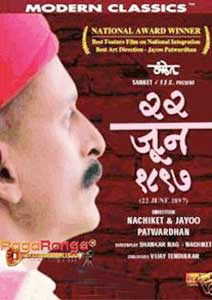22 June 1897
22 June 1897 Marathi is a 1979 Marathi film, cowritten by Shankar Nag and Nachiket Patwardhan and directed by the husband and wife team of Jayoo Patwardhan and Nachiket Patwardhan. The duo are also practising architects. It is based on the true life story of the assassination of British Government officers Rand ICS and Lt. Ayerst. The film has been included in the book One Hundred Indian Feature Films An Annotated Filmography, a representative selection from the first Indian talkies to the thenpresent date 1988. The title of the film is the date of the assassination,June 1897. It won the 1980 Indian Silver Lotus at the National Film Awards in two categories Best film on National Integration and Art Direction. It also won the 1980 Maharashtra State awards for best film of the year and best director. The film has been included in the selected collection of Indian films and videos in the US Library of Congress. Most of the performers in the film then belonged to Theatre Academy, Pune.
The film is based on the true life events leading up to, and the consequences of, the assassination of Charles Walter Rand, Assistant Collector of Pune and Chairman of the Special Plague Committee, Pune, and British Army officer Lt Charles Egerton Ayerst. Ayerst was Rands military escort onJune 1897 by the Chapekar brothers Damodar Hari, Vasudev Hari and Balkrishna Hari and Mahadeo Vinayak Ranade, Khando Vishnu Sathe a school boy was charged as a coconspirator and sentenced toyears rigorous imprisonment.The film was the directorial debut of Jayoo and Nachiket Patwardhan, commissioned by the National Film Development Corporation of India NFDC on a shoestring Rupees 350,000 budget. Jayoo Patwardhan scouted for locations in Wai and Pune for the period look, poring over scores of photographs obtained by her grandfather, and spending months researching the details. The film was shot entirely on locations in Pune, Wai and Mumbai in March and April 1979. The codirector considers the film a solid piece of history with huge archival value. Vijay Tendulkar its dialogue writer considered that the film is significant because it shows the way history needs to be treated in cinema in a deglam manner where martyrs are also shown as human beings, and judged the effort to be stupendous given the tight budget and other limitations of the time. The dialogues I wrote were brief and simple, just like the script demanded, felt Tendulkar. ........
Source: Wikipedia


